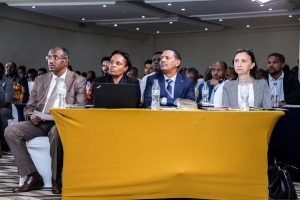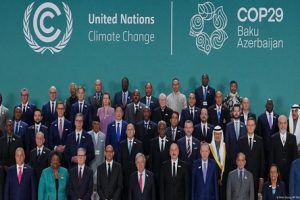
Europe is the largest importer of Coffee from Ethiopia and some African countries. As it moves to discourage the clearing of forest for the plantation of coffee and other cash crops it has issued a new law governing the growing of coffee that is exported to its territory.
The law states that coffee growing should not involve the clearing of forest, among others. For this to take effect the Union has given a grace period that ends at end of this year, 2024. Considering the short time available to tailor the coffee production as per the new regulation it is important to ask how prepared are countries like Ethiopia to comply with it.
“The new Regulation (EUDR) is not that a trouble for Ethiopia’s timber and coffee industries to do so. However, it requires significant dedication and coordination,” someofficials said.
The European Union’s new initiative, the EU Deforestation-Free Regulation (EUDR), aims to combat deforestation caused by forestry and agricultural activities on a global scale and mitigate its negative consequences.
Europe is one of the largest importers of commodities linked to deforestation, including 50% of the world’s coffee and 60% of all cocoa. The regulation aims to address the impact of commodities like coffee and cocoa, which alone accounted for over 25% of global tree cover losses between 2001 and 2015. Also, this regulation targets promoting sustainable development by avoiding environmentally harmful practices.
Kabtamu Girma, Chief Executive Officer, Natural Forestry at Ethiopian Forestry Development, have stay with The Ethiopian Herald on the argument that the EUDR regulation is right and that Europe will be implementing it at the end of this year. According to him, Ethiopia has actively worked to reduce carbon emissions in line with the several climate change accords it has already signed. It has also worked to restore droughts, floods, and deforested land.
Kabtamu stated that Ethiopia will face minimal challenges in implementing the new EUDR legislation, he also remarked on the green legacy program, particularly REDD and other initiatives, which have been the primary focus for the past five years. However, he emphasized the importance of evaluating and improving the country’s existing green economy policies and strategies.
According to Gizat Worku, General Manager of the Ethiopian Coffee Association, the product should be free from any sort of illegal activity, such as child labor. The government should provide evidence and document scrutiny for all things, which is not that much harder. Even EUDR itself would not be such a difficult task, especially for Ethiopia, as we do not plant coffee on deforested farmland.
For instance, in Sidama State, the planting of firewood trees for fuel is an annual practice. However, this activity often encroaches on land borders, posing challenges for coffee farming. Ensuring that the coffee produced in such areas is deforestation-free becomes crucial, particularly when satellite imagery is employed, Gizat said.
Adugna Debela, director of the Ethiopian Tea and Coffee Authority (ETCA), told the Ethiopian Herald that Ethiopia is primarily known for its forest coffee, and we are producing coffee in an area where there are shade trees.
He stated that the replacement of old coffee trees does not contribute to deforestation. Instead, farmers cultivate rapidly developing coffee trees and replace them gradually rather than removing them all at once. Additionally, they plant shade trees to mitigate the impact of climate change. The ETCA aligns with the European regulation in its commitment to a sustainable and environmentally friendly approach, including the prohibition of child labor and deforestation in the coffee sector.
Kabitamu emphasized the fact that the legislation will present challenges when it is put into operation, and because it speeds up sustainable development, the government should force the relevant organizations must took work together.
With limited time available, Kabtamu emphasized the need for Ethiopia to assess and enhance its current approaches. By doing so, the country can align its efforts with the goals of the new legislation and ensure effective implementation.
He further stated that the media should be used to assist in informing the necessary parties about the regulations and to encourage them to participate in national awareness and movement campaigns.
According to ETCA data, the ETCA’s training programs, partnerships with researchers, and distribution of improved seeds and seedlings aim to address challenges posed by climate change. By replacing old coffee trees with new ones, Ethiopia strengthens local communities and promotes economic prosperity. However, the lack of infrastructure and support remains a hindrance for smallholder farmers in proving compliance with and adapting to the new regulations.
However, the new EUDR has an effect on coffee production in Ethiopia; we will continue to strengthen the process of producing coffee under forest and shade trees by teaching the farmer, Adugna added.
It is known that Ethiopia is engaged in a variety of initiatives aimed at preventing climate change-related issues in order to maintain sustainable development. A particular program that has been described is referred to as the green economy, and it incorporates the entire community.
According to ETCA’s data, the Green Legacy campaign focuses on the coffee sector, leading to the annual planting of 1.251.39 billion coffee seedlings. This initiative plays a crucial role in preventing climate change and protecting the environment. Furthermore, the presence of forests in the western and southern parts of Ethiopia owes much to coffee cultivation. The Green Legacy campaign contributes to the preservation of forests while supporting the growth of the coffee industry.
Adugna further stated that the new EUDR system is a legal requirement that links the coffee grower and the buyer directly, freeing farmers and consumers who have been harmed by brokers and empowering brokers to exercise more control.
Kabtamu remarked that with the establishment of a law enforcement organization, the community would gain the ability to produce coffee autonomously, right in their own gardens. This initiative would empower individuals to engage in the process of coffee manufacturing, allowing them to cultivate coffee plants and ultimately contribute to local coffee production. Such a self-sustaining approach would foster community resilience and promote economic independence, he added.
According to officials, the EUDR legislation is more about opportunities than challenges for Ethiopia’s coffee industry. Also, overcoming the challenges posed by limited infrastructure and support is crucial for these farmers to prove compliance and benefit from the opportunities the EUDR presents.
By embracing innovation, sustainability, and green economy strategies, Ethiopia can strengthen its position in the global coffee market, protect its forests, and support local communities while meeting the requirements of the new regulation.
BY FIKADU BELAY
THE ETHIOPIAN HERALD WEDNESDAY 14 FEBRUARY 2024





